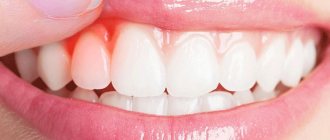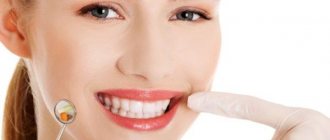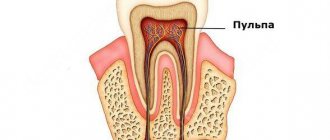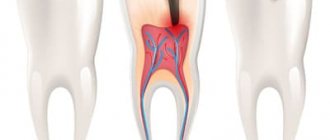15.09.2016
Author: Dentist-therapist Kuzub Yana Nikolaevna
To keep teeth healthy, both the general condition of the body, good hygiene, timely treatment, and the foods that the patient eats daily are important. Dentist-therapist at the Attribute Clinic, Yana Nikolaevna Kuzub, shares useful information about what foods and drinks are healthy, and what you should avoid to maintain a healthy smile.
WATER
Since the human body consists of more than half of water, it is logical to conclude that water is an important product for our body. Water is also good for dental health.
If you drink little water during the day (precisely water. Juices, soda, tea, coffee, soups do not count), among other negative consequences, you will experience a feeling of dry mouth. This means that not enough saliva is produced: a logical consequence of dehydration, because saliva is 98.5% water.
The composition of saliva includes mucins (no more than 0.5% of the total chemical composition of saliva). Due to them, saliva not only has viscosity and elasticity, but also prevents the formation of bacterial plaque, because blocks the proliferation of harmful microorganisms.
However, you need to know that saliva can harm your teeth if you like sweets. In this case, it will contain large amounts of glucose, as a result of which it will only harm tooth enamel.
In addition to the fact that the possibility of salivation that protects teeth depends on water, water helps to mechanically clean the oral cavity of food debris, plaque and acids harmful to tooth enamel.
Traditional methods
For inflammation of the gums, rinses, applications, and oral baths with antiseptic anti-inflammatory drugs are most often used.
- Rinse - intensive rinsing of the mouth with herbal infusions or ready-made medications. The procedure should be carried out after eating. The solution should not be too hot.
- Mouth baths are good for inflammation. Warm healing decoction must be held in the mouth for 30-60 seconds, repeated 5-7 times a day.
- Applications are indicated for advanced inflammatory processes. A gauze bandage soaked in the medicine is applied to the inflamed area of the gum for 10-20 minutes, 2-3 times a day.
Traditional methods of treatment are designed for long-term use; you should not expect healing after the first procedure.
Propolis tincture
Used for rinsing and mouth baths. Dissolve 20 drops of propolis alcohol tincture in a glass of warm water and rinse your mouth 4-5 times a day. Soak a gauze strip with an aqueous solution and apply it to the inflamed gum for several minutes.
Garlic
An excellent natural antibiotic, used for rinsing. Soak one part of garlic for 30 minutes in three parts of water, rinse the mouth with the resulting infusion three times a day.
Sea salt
Strengthens gums, has an anti-inflammatory effect, reduces bleeding, suitable for rinsing and rubbing. Dissolve 1 tablespoon of salt in a glass of water and rinse your mouth after eating. You can prepare an effective rubbing paste at home. Mix 3 tablespoons of sea salt, 2 tablespoons of crushed dried banana skins with a small amount of olive oil until a thick, homogeneous mass is obtained. Rub into gums morning and evening.
VEGETABLES, FRUITS, BERRIES, GREENS
Everyone knows that vegetables, unsweetened fruits and greens should be an important part of every person’s diet in order to maintain the balance of vitamins, minerals and other beneficial microelements in the body.
However, fresh vegetables, fruits and herbs are important for dental health, as they provide essential vitamins and minerals.
It is important to focus your diet on carrots as a source of keratin, pumpkin, which can restore white teeth due to the selenium it contains, and greens, especially spinach, which is rich in calcium.
Vegetables and greens enrich saliva with minerals that are beneficial to the health of tooth enamel (phosphate, fluoride, calcium).
It is important to understand that minerals are “leached” from teeth over time. Therefore, for the health of your teeth enamel, you must remember to eat fresh vegetables, herbs and unsweetened fruits.
Don't forget to take care of your gum health. Hard varieties of vegetables and fruits will help with this. Chewing solid food has a massage effect on the gums, thereby improving blood circulation in the mouth.
Greens will help take care of healthy oral microflora (parsley is especially good for this task), because contains antibacterial substances that can stop inflammatory processes, get rid of bad breath, and prevent caries.
Useful herbs for teeth and gums
Every woman dreams of strong, beautiful teeth (okay, let’s be honest, every person!). Smiling at your loved ones, saying kind words to your loved ones - what could be more pleasant? But there are a number of problems that can extinguish even the sweetest smile. These include bad breath, inflammation and bleeding of the gums, painful reaction of the teeth to cold, sour, and sweet foods. And with age, the gums weaken, and the teeth can become completely crooked!
Buy oak (bark) on our website
In order to maintain a charming smile, we recommend that you resort to the help of traditional medicine. Effective recipes have come to us from those times when there were no toothpastes and dentists. They will help you too! Don't know what herbs you can use for teeth and gums? We'll tell you.
From an unpleasant odor
Do you know what causes bad breath? The culprits of unpleasant odor are microorganisms that multiply in the mouth and digestive system. This problem is especially aggravated by caries. Plants that contain tannins and phenols, which suppress the vital activity of organisms, will help cope with the smell. Are you wondering what kind of herbs these are? Here is the list:
- Burdock root disinfects gums, removes putrid odor and yellow plaque from the surface of teeth.
- Oak bark has long been used as an antimicrobial agent. It eliminates unpleasant odor, heals minor gum damage, and reduces toothache. Effective for periodontitis.
- Sage inhibits bacterial growth.
- Nettle treats stomach ailments that may cause bad breath.
For inflammation and bleeding gums
Many people, noticing blood while brushing their teeth, simply do not pay attention to it. But in vain, because this is the first sign of gingivitis and periodontitis. Don't want your teeth to fall out prematurely? Then use herbs for gum inflammation!
Here is a list of the best plants that are used to relieve irritation, reduce bleeding and strengthen gums:
- Aloe has a strong astringent effect, increases blood clotting, and quickly eliminates bleeding. The plant juice is best used diluted due to its acidic reaction.
- Celandine fights gum swelling, traumatic lesions, and is effective against periodontal disease.
- Desiccant reduces bleeding and triggers regeneration of the oral mucosa during stomatitis.
- Strawberries strengthen gums. Berries and infusions of leaves prevent periodontal disease and scurvy, a sign of which is loose teeth.
- Stevia leaves quickly relieve inflammation in the oral cavity and soothe gums. The plant has a hemostatic and antibacterial effect.
Interesting fact
Stevia is not only an herb for rinsing gums, it can be added to teas instead of sugar. It tastes sweet, but does not cause tooth decay.
For toothache
Toothache occurs due to inflammation of the nerve, but many people experience pain when eating hot or cold foods. But there are also people whose teeth react to sweet and sour foods. Are you having the same problem? This means we need to double our care of tooth enamel! Medicinal plants from the following list will help strengthen it and relieve pain:
- Snakehead has an analgesic effect and strengthens teeth.
- Garlic prevents tooth decay from developing.
- Melissa will help get rid of toothache and is effective for stomatitis.
- Lungwort reduces toothache due to pulpitis, reduces tooth sensitivity to cold, hot, and sour.
- Cinquefoil has a mild analgesic, antibacterial and whitening effect.
- Calamus root dulls toothache, strengthens teeth, and has a positive effect on the enamel structure. The plant is used to prepare rinses. And smokers are recommended to simply chew the root - this allows them to quickly give up the bad habit (which will ultimately have a positive effect on the color of their teeth).
Important
Herbs cannot cure pulpitis and other inflammatory diseases that develop inside the tooth. Folk remedies only temporarily relieve the pain, and to eliminate its cause you will have to consult a dentist. And the sooner the better, because the inflammatory process can spread to the periosteum!
NUTS and SEEDS
Nuts and seeds contain substances beneficial for teeth in particularly concentrated quantities, and therefore it is extremely important to eat them regularly.
It will be good if you eat not the same type of nut always, but different varieties of seeds and nuts. Introduce walnuts and pine nuts, hazelnuts and Brazil nuts, sesame seeds, sunflower seeds, and flax into your diet. This is important because the composition of nutrients in each nut is different, and therefore the effect is different for everyone. For example, pine nuts help the development of dental bone tissue.
At the same time, remember that cracking nuts with your teeth is a procedure that is traumatic for the tooth, so it is better to avoid it. For the same reason, it is harmful to crack seeds.
Rinse recipes to strengthen gums and stop bleeding
Knowing the purpose of certain plants, you can create mixtures and prepare rinses yourself. But there are recipes that have been tested over the years, many of which are effective and at the same time very affordable.
1. Mix 1 part string, 1 part raspberry leaves, 1 part strawberry leaves and 2 parts cold mint. 1 tablespoon of the mixture is poured into 200 ml of boiling water and left for 30 minutes. Rinse with warm infusion.
2. Mix 1 tablespoon of dried raspberries and 1 tablespoon of dried black currants, pour 300 ml of boiling water, leave for 3 hours, then rinse your mouth.
3. You can also use infusions from just one plant. So, taking a choice of 1 teaspoon of sage, chamomile, eucalyptus, St. John's wort or calendula, brew it with one glass of boiling water, let it brew and rinse your mouth with the still warm infusion.
What foods are harmful to teeth?
SWEET DRINKS
Sweet carbonated drinks are harmful to the body, especially to the teeth.
So-called soda and juice packages contain a lot of sugar, which not only destroys enamel, being a breeding ground for harmful bacteria, but also changes the chemical composition of saliva, saturating it with glucose, which also has an additional detrimental effect on dental health.
In addition, such drinks contain additives that can disrupt metabolic processes in the body.
Since sweets are harmful to teeth, you should not get carried away even with freshly squeezed natural juices, sweet fruits and berries. The fruit acids and glucose they contain can destroy tooth enamel.
Plain water will help prevent the negative effects of natural juice: just rinse your mouth with it.
SWEETS
Sweets can not only destroy a tooth, but also interfere with its natural restoration, because... The sugar they contain interferes with the absorption of calcium.
The only permitted sweet product can be dark chocolate, but only with a very high cocoa content. This chocolate can even prevent plaque because it contains antibacterial substances.
And if you really want to, please don’t forget to use dental floss after eating and rinse your mouth with water after eating.
DRIED FRUITS
This seemingly useful product, from the point of view of dental health, has a significant drawback - the viscosity of the product structure. This causes them to stick and get stuck in your teeth. Therefore, after eating dried fruits, you should not forget to use dental floss.
CAFFEINE
Coffee and other drinks containing caffeine dehydrate the body, interfere with absorption, and lead to vitamin and mineral deficiencies (including calcium). If you find it difficult to give up coffee, replace it with chicory.
Many people do not know that caffeine is found not only in coffee, but also in black and, especially, green tea. So if you like green tea (or black), try replacing it with herbal tea.
SIMPLE CARBOHYDRATES
And again about sugar. It is found not only in sweets and sugar. Simple sugars are part of starch, which, among other things, consists of potatoes (which is why dishes made from them are so unhealthy), and high-grade white flour.
If you find it difficult to give up flour products, switch to products that include whole grain flour.
ALCOHOL and MEDICINES
When drinking alcoholic drinks, try to dilute them with water, if possible, and then brush your teeth. In addition to the fact that alcohol contains a lot of sugar, which has a detrimental effect on enamel, it also causes dehydration, which means that the production of saliva, an important tool for protecting teeth and oral microflora, is reduced.
Just like alcohol, some medications can cause dehydration, so be sure to drink plenty of fluids while taking your medications.
Roasted nuts and seeds
Only fresh nuts and seeds, in particular, are good for the body and teeth. Fried ones, on the contrary, are harmful. And here's why: the beneficial substances contained in the fresh product are destroyed during the frying process. Moreover, harmful substances are formed in large quantities.
If you can't avoid roasted nuts or seeds, it will be less harmful to your health if you buy them fresh and only lightly roast them yourself at home.
Methods and methods for self-treatment of gums at home
If you cannot make an appointment with a dentist to treat your gums, self-treatment of your gums should be done in stages. First of all, it is necessary to relieve pain, then swelling and bleeding in the gums. You can prepare a remedy for gum inflammation yourself. An effective natural remedy for sore gums must be fresh, its shelf life does not exceed 24 hours after brewing. For self-treatment of gum inflammation, you can use decoctions, infusions, ointments, fresh extracts and plant oils. Medicinal products for strengthening gums and teeth are used as solutions for mouth rinsing and as solutions for applications, which should remain in the diseased gums for a certain time, about 20 minutes. The herbs included in the gum rinse for inflammation can be either fresh or dried. Rinse for teeth and gums during inflammation should be regular, preferably at the same time, throughout the entire period of treatment. On average, a course of gum treatment with folk remedies takes 1 – 2 weeks.
General scheme (method) for treating gums at home:
- First we remove swelling and inflammation.
- This requires astringents and antibacterial agents. For example: rinsing with saline solution 2 times a day, calamus root infusion 2 times a day, oak bark decoction 2 times a day, hydrogen peroxide 2 times a day. After each rinse, apply amaranth oil to the sore gum for 20 minutes.
- After 4 - 6 days we change the drugs.
- As the swelling and inflammation subside, keratoplasty drugs are needed. If there is no allergy, we use fresh propolis (not an alcohol tincture of propolis, but propolis oil) for applications to the gums 2 times a day in the morning and evening, during the day we apply sea buckthorn or rosehip oil. We also continue to use amaranth oil, but now in addition to compresses on the gums, also 1 tablespoon inside in the morning and evening.
If the cause of inflammation of the gums is a sore tooth, then swelling of the gums can develop into periostitis (flux), and pus accumulates in the mouth under the gum. This condition is life-threatening, because the spread of pus can go into the internal cellular spaces of the neck and floor of the mouth and be complicated by phlegmon. Such purulent processes are accompanied by high fever, weakness and dizziness, sweating and chills. Therefore, if you are in the city, be sure to consult a doctor. If you are hiking in the forest or mountains and there is no doctor, you need to take broad-spectrum antibiotics or fluoroquinolones (for example, Rulid, Avelox) and, if possible, ensure evacuation by the police or the emergency services of the Ministry of Emergency Situations to the maxillofacial department of the hospital.
Ask a question!
8
We'll call you back in 1 minute
Hydrogen peroxide solution for rinsing
What strengthens weak gums due to bleeding caused by removable acrylic dentures? This is the well-known and accessible hydrogen peroxide! Prepare a mouth rinse solution. You will need hydrogen peroxide (you can buy it at a pharmacy, usually a 3% solution) and water. Add a tablespoon of peroxide to a glass of water. The solution is ready. Rinse throughout the day, three or four times will be enough.
Oak bark for gums: a homemade recipe
Oak bark is one of the remedies that helps to effectively and in a short period of time get rid of bedsores and ulcers caused by wearing dentures and other problems associated with the gums and oral mucosa. In order to prepare the decoction you will need 500 grams of water and oak bark, about 2 tablespoons (pre-grind). Cook the bark over low heat for a quarter of an hour. Leave for 20 minutes. Rinse your mouth with the strained solution.
Rinse with soda for gum inflammation
Baking soda is useful for treating gums at home. We will prepare a soda-based rinse solution. You will need 200 grams of water, a teaspoon of soda, a pinch of salt and a sage decoction (about 50 grams). Mix the ingredients. Rinse at least four times a day.
Herbal rinse solution
If gums are bleeding due to the edges of metal-ceramic crowns, the following solution may be useful: you will need a spoonful of the following herbs: St. John's wort flowers, elderberry and strawberry leaves. Boil the mixture over low heat for 15 minutes, remove from heat. Infuse the decoction for 40 minutes. Rinse your mouth every 2 hours during the day.
Rinse your mouth with St. John's wort infusion
Take a spoonful of herbs, pour boiling water, 200 grams will be enough. Leave for 40 minutes. Strain and rinse your mouth.
Aloe for gum inflammation
Aloe compress: wash the plant leaf, remove the thorns and cut lengthwise. Apply to gums for 15 minutes.
Saline gum rinse
To prepare, you will need salt (it is better to use sea salt), one tablespoon and water, approximately 150 grams. Rinse your mouth with the solution a couple of times a day. You can simply rub salt into your gums. Sea salt relieves inflammation.
Chamomile and calendula for gum inflammation
Self-treatment of gums at home - chamomile and calendula. These plants relieve inflammation well. To prepare the infusion, you will need a tablespoon of chamomile or calendula, pour boiling water over the herb (a glass will be enough). Let it brew. Strain. Alternate infusions.
Let's prepare an infusion of pine buds for gums
To prevent gum inflammation when wearing zirconium crowns, we prepare an infusion of pine buds. This relieves redness and inflammation from irritated areas of the gums. You will need a tablespoon to chop the kidneys. Pour water (you will need half a liter) and boil for 10 minutes. Leave for an hour. Rinse with strained infusion.
Propolis: alcohol tincture for gums
Treatment of gums at home is also possible with an alcoholic infusion of propolis. Add 20 drops of tincture to a glass of warm water and you can begin the rinsing procedure.
Calamus root
To prepare a solution for rinsing, you will need calamus root (a tablespoon of crushed), pour boiling water (200 grams). Let it brew and you can use it. This type of solution copes with inflammation and removes unpleasant odor from the mouth or from under dental crowns.
Honey + salt
One of the well-known and useful methods of relieving inflammation is a mixture of honey and salt (preferably sea salt, of course). To prepare, you will need a spoon of honey and 4 tablespoons of salt. Mix all ingredients. Rub the mixture onto problem areas of the gums.
Black radish
You can treat gums at home at any time. If you have black radish at home, then this is a great way to get rid of bleeding gums. Extract the juice from the fruit and rinse your mouth with it.
Decoction: linden flowers and oak bark
To prepare an effective decoction you will need two tablespoons of crushed oak bark and a spoonful of linden flowers. Mix everything, you get a mixture. Take a spoonful of the mixture and fill it with water (200 grams will be enough). Let it boil for 2 minutes, leave for 20 minutes. Rinse your mouth with warm, strained broth. Thanks to oak bark, the effect will be noticeable after the first procedure.
Nettle leaf decoction for gums
Let's prepare an infusion (decoction) of nettle leaves. You can use fresh or dry leaves and the effect is the same. Just be careful when chopping fresh leaves. To prepare, you will need to pour a spoonful of crushed leaves of the plant with water (200 grams of boiling water). Leave the solution for 30 minutes. Rinse your mouth at least three times a day. To avoid treating inflammation and bleeding gums, eat more vegetables and fruits. Watch your diet. Do not abuse alcoholic drinks and smoking. Be sure to use dental floss after eating or simply rinse your mouth well. Remember that oral hygiene in the morning and evening will help avoid problems with gums and teeth. You can use gum treatment at home, that is, traditional methods, together with medications.
This article is for informational purposes only and does not encourage you to treat your gums at home. We strongly recommend using the recipes described above only after consulting a doctor.
Just pick up the phone and call us!
8
We will definitely make you an offer that you cannot refuse!











